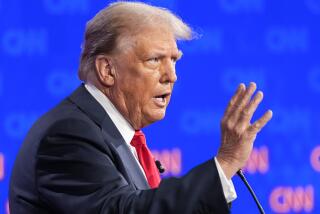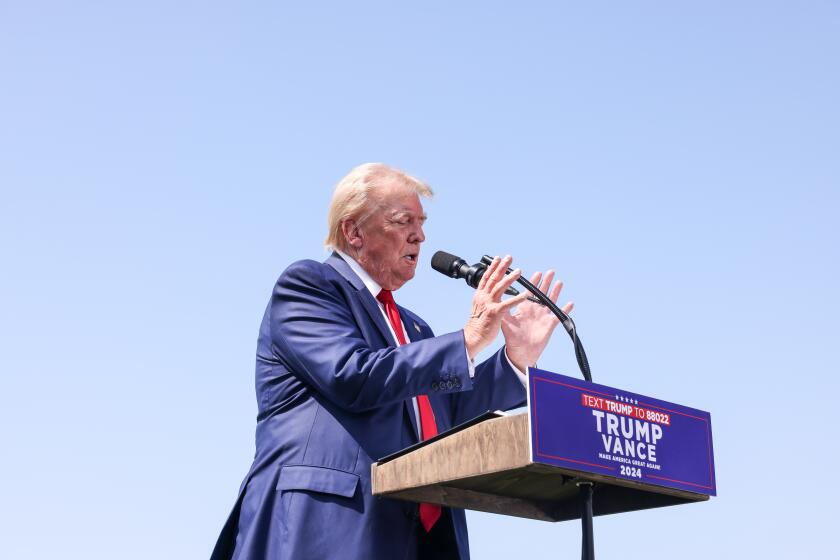Politics as Simple as ABC : STRANGE BEDFELLOWS: TV Anchors, Talk-Show Hosts and Presidential Candidates in the Improbable Campaign of 1992, <i> By Thomas Rosenstiel (Hyperion: $24.59; 358 pp.)</i>
Sophisticated analyses of American presidential elections long ago recognized that the most important locus in determining their outcome is not the voting booth but the TV studio. Except for the minuscule number of voters who actually are willing and able to engage a presidential candidate in a substantive discussion of issues, our elections are literally television shows to most voters, and hence, are treated as such by the people who plan and executive the campaigns.
It therefore makes perfect sense that Times media reporter Thomas Rosenstiel decided that in order to add something both new and important to the never-ending body of campaign literature, he would focus not on the campaigns themselves, but on the networks that presented them to the public. The result is “Strange Bedfellows,” a well-written and extremely informative work of original campaign journalism.
Rosenstiel’s rather bulky subtitle, “TV Anchors, Talk-Show Hosts and Presidential Candidates in the Improbable Campaign of 1992,” does not really do justice to his subject matter. Rather, the book is a tightly focused examination of how and why one network news show, “ABC News’ World News Tonight,” chose to present the election the way it did. Rosenstiel says he chose ABC because it had the classiest and most professional news operation of the four networks, and he was granted what appears to me a most complete access to its inner workings in his quest to tell the story behind the story.
Indeed, his access was extraordinary, and for that reason alone, “Strange Bedfellows” will make compelling reading for political junkies. More valuable for the general reader, however is Rosenstiel’s trenchant evocation of the manner in which news decisions are made at the networks. We see producers and correspondents begging to be given an extra two minutes for candidate profiles as if a thoughtful, comprehensive portrait of a man’s character and political philosophy could be presented in 240 seconds rather than 120. (Permission for the extra time was generally denied.)
We see the results of the relentless cost-cutting mentality at the networks which, when combined with the “down-market” pressures of tabloid TV, make it almost impossible for producers and correspondents to provide the kind of analysis that would cut through the cliches behind which most politicians would prefer to hide. Most of all, we see the intensity of the competitive pressures that drive the network’s decision-making process; the consistent need to get the story first--if only by a matter of minutes--frequently at the expense of getting it right.
The producers, correspondents and executives at ABC are without exception presented as well-meaning men (and ever-so-occasionally women) who, within the limited contexts of the various pressures that are shaping their work, are trying to do the best job they can. Rosenstiel has particular sympathy for anchor Peter Jennings, commentator Jeff Greenfield and Brit Hume, who apparently considers himself something of a token pro-Bush conservative at the network. (Rosenstiel sheds no light on the controversy as to whether Hume was, in fact, Bush’s regular tennis partner while simultaneously serving as White House correspondent.) For some reason, NBC’s Andrea Mitchell seems to have earned the author’s ire, and her work is criticized on two occasions in harsher terms than nearly anyone else in the story.
Perhaps Mitchell’s brief reports on the campaign really were markedly inferior to those offered up by the correspondents on “World News Tonight.” I say this as someone who has no idea, because to tell the truth, I can’t tell the difference between any of the network’s regular news coverage. With the exception of Ted Koppel’s “Nightline,” the intellectual quality of network television news strikes me as almost uniformly awful and getting worse. Issues are generally personalized, sensationalized and simplified to the point where the average 45-second report obscures more than it illuminates.
The campaign handlers, if they are remotely competent, can, through a process of careful feeding and grooming, manipulate the reporters to present almost exactly the pictures and sound bites they want the voters to hear. And the networks, despite the increasing sense that they are losing their franchise to Larry King and talk radio, are so heavily invested in their current modus operandi that they appear virtually helpless to help themselves.
Rosenstiel offers up a particularly telling anecdote in this regard when he demonstrates how stultifyingly complex ABC found it to try to offer the candidates the opportunity to debate without the interference of a network moderator. A few weeks later, the non-network affiliated, Phil Donahue, simply turned over his studio to Bill Clinton and Jerry Brown and took a powder for an hour.
But Rosenstiel’s virtues as a thorough reporter do not always take his work as far as his subject needs to go. His first major problem is simply bad luck. He decided, quite sensibly, before the campaign began, to focus all of his reporting efforts on ABC News. Yet in this election, all four networks played follow the leader. Whether the leader turned out to be Larry King, Phil Donahue or “The National Star” depended largely on extremely worrisome circumstantial events. But the fact remains that despite all of the actors’ self-conscious thoughtfulness on display here, much of what Roone Arledge, Peter Jennings, et al., eventually decided turned out not to matter a whole lot.
The second problem with “Strange Bedfellows” is Rosenstiel’s reluctance to examine the underlying ideas that shape these newsmakers’ decisions. Yes, Peter Jennings probably leans liberal, and Hume conservative, and Greenfield goes back and forth, but from where do their understandings of the world derive?
Certainly no one would argue that the ideas that animate our politics and set the parameters of our political discussion begin with the likes of Peter Jennings and Brit Hume. Yet rarely does Rosenstiel take his analysis much beyond the explanations of the actors themselves. One can accept or reject arguments that political coverage is ultimately driven by the concentration of corporate ownership of the media, as Ben Bagdikian would argue, or the by stranglehold on political debate by insider pundits--the explanation favored by the author of this review. But certainly these ideas derive from somewhere.
A final problem deriving from Rosenstiel’s technique is his willingness to tell the story he believes to be true in many cases without citing his sources. This practice has become increasingly common among even the most conscientious author/journalists and he explains it on the basis of his judgment that the “benefits in telling the story fully outweighed whatever disadvantages these methods posed to those who might be interested in turning to this book for future studies.”
But this explanation slights the problem. It is not only future historians who will find this practice problematic, but those readers who are seeking to judge the relative disinterestedness and veracity of the comments and explanations involved. TV journalists, as Rosenstiel amply demonstrates, are politicians for many practical purposes, and hence, under many of the same pressures to shade or color the truth to make themselves look good. While Rosenstiel does not seem to have fallen victim to this type of manipulation, his legitimation of it could encourage less conscientious reporters in the future.
More to Read
Get the L.A. Times Politics newsletter
Deeply reported insights into legislation, politics and policy from Sacramento, Washington and beyond. In your inbox three times per week.
You may occasionally receive promotional content from the Los Angeles Times.










